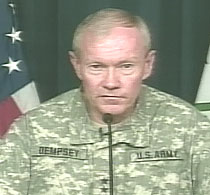-
(单词翻译:双击或拖选)
Washington, D.C.
13 June 2007
U.S. lawmakers got the chance to question the man who recently led the multi-national force in charge of training Iraq's new security and police forces. U.S. Army Lieutenant1 General Martin Dempsey told lawmakers in a House subcommittee of numerous frustrations2 in logistical and other matters. VOA's Robert Raffaele has the story.
 |
| General Martin Dempsey |
Tuesday on Capitol Hill, the man who oversaw5 the training of the Iraqi security and police forces for 22 months said Iraq's fledgling security forces simply are not ready to take control from U.S. troops.
"The scarcest resource we've got is not time, it's not money, it's leaders in Iraq,” says U.S. Army Lieutenant General Martin Dempsey. “We are running into a challenge of getting leaders into place that can turn the capacity we've provided into a capability6. That's really the challenge."
General Dempsey said one big problem is local corruption7.
“Police forces in the region are notably8 corrupt,” said Dempsey. “Police forces live locally, their families live locally, they don't really have a sense of nation, they have a sense of local community and all the influences that are brought to bear."
Another problem: computer databases that are not linked, and fail to provide up-to-date records. General Dempsey acknowledged that of some 188,000 Iraqi security forces trained by the U.S. as of last December, as many as seven to eight thousand are unaccounted for. He conceded there is no way of knowing how many of those Iraqis could now be attacking U.S. troops. General Dempsey said he believes Iraq's national forces will be capable of taking charge of security soon, but he said local forces are not up to the task.
"The Kurdish region is stable, the deep Shia south is stable, al-Anbar is looking promising9, but Baghdad, Diyala, Salahuddin, and At-Ta'mim, which is the faultline, they're not stable and the local police are not effective there."
General Dempsey said he is encouraged by what he is says is the Iraqi people's expressed desire to take over security. But he warned that time may be running out.
"I heard General Abizaid say three years ago, that there would undoubtedly10 at some point in this mission be a point of descending11 consent -- where the population would either want to be completely in control of their own destinies or begin to blame us for the failures of their government. And I think we have to be alert for that point. I don't think we're there yet, but we certainly need to keep our eye on that."
 收听单词发音
收听单词发音
1
lieutenant

|
|
| n.陆军中尉,海军上尉;代理官员,副职官员 | |
参考例句: |
|
|
|
2
frustrations

|
|
| 挫折( frustration的名词复数 ); 失败; 挫败; 失意 | |
参考例句: |
|
|
|
3
insurgent

|
|
| adj.叛乱的,起事的;n.叛乱分子 | |
参考例句: |
|
|
|
4
allied

|
|
| adj.协约国的;同盟国的 | |
参考例句: |
|
|
|
5
oversaw

|
|
| v.监督,监视( oversee的过去式 ) | |
参考例句: |
|
|
|
6
capability

|
|
| n.能力;才能;(pl)可发展的能力或特性等 | |
参考例句: |
|
|
|
7
corruption

|
|
| n.腐败,堕落,贪污 | |
参考例句: |
|
|
|
8
notably

|
|
| adv.值得注意地,显著地,尤其地,特别地 | |
参考例句: |
|
|
|
9
promising

|
|
| adj.有希望的,有前途的 | |
参考例句: |
|
|
|
10
undoubtedly

|
|
| adv.确实地,无疑地 | |
参考例句: |
|
|
|
11
descending

|
|
| n. 下行 adj. 下降的 | |
参考例句: |
|
|
|















